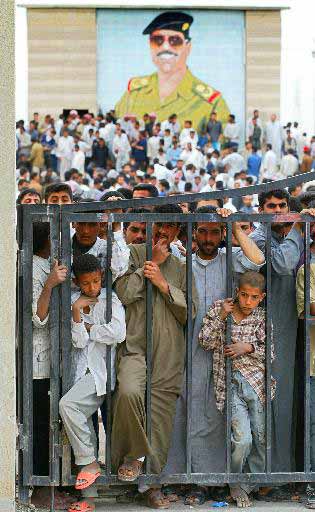The State Department said it is sending 26 police and judicial officers to Iraq, the first component of a team that will eventually number about 1,200. Much of the looting in Baghdad and other cities has targeted government ministries and the homes of former regime leaders, but looters also have ransacked embassies, hospitals and private businesses. Also looted was the Iraq National Museum, the country's flagship archaeological museum, which featured priceless artifacts dating back to 5,000 B.C. Reporters visiting it Saturday saw row after row of empty glass cases, many of them smashed, and bits of broken pottery and sculpture on the floors. U.S. forces reopened two strategic bridges Saturday in the heart of Baghdad - giving looters easier access to territory that had previously been spared. U.S. forces watched but did not intervene as plunderers swarmed into several government buildings, including the Planning Ministry, and emerged with bookshelves, sofas and computers. Aid organizations, as well as many Baghdad residents, have pleaded with U.S. officials to crack down on the looting. "The humanitarian situation is worsening as a consequence of widespread lawlessness," said InterAction, a Washington-based coalition of more than 160 U.S. aid groups. Iraq-based relief workers with CARE reported that hospitals are "in absolutely dire straits," with some looted and others closed to prevent looting. Abbas Reta, 51, a Baghdad engineer with five children, was distraught at the looting of schools and hospitals. "If one of my family is injured where will I take them now? When the schools reopen, my children will have no desks to sit on," he said. "The Americans are responsible. One round from their guns and all the looting would have stopped." In another Baghdad neighborhood, residents complained that U.S. soldiers thus far have not heeded requests to clear cluster bombs dropped during the war. The residents said three people had been killed and one injured trying to pick up the unexploded ordnance. Najah Jaffar, 51, described his attempt to get American help removing the bombs. "When I spoke to the soldier, he said, `It takes time.' I think many people will be injured. Many bodies, many children will be killed without reason," Jaffar said. "This is no peace." Looting diminished Saturday in the northern city of Mosul, a day after pro-Saddam defense forces dissolved and U.S. special forces moved in. However, a Mosul hospital reported that 10 people had been killed in Arab-Kurdish violence that broke out as control of the city changed hands. In Kirkuk, another northern city taken this week from Iraqi regime forces, there were signs of cooperation Saturday among the region's different ethnic groups. The Arab television network Al-Jazeera reported an agreement to form a local administrative body divided evenly among Arabs, Kurds and ethnic Turks. Next, the U.S.-led coalition is expected to focus on Saddam's hometown, Tikrit, where some Iraqi forces are believed to be regrouping. However, the U.S. Central Command said many of the troops there have fled in the face of heavy airstrikes, and the remnants may not be able to muster an effective defense. Tikrit, 90 miles northwest of Baghdad, has long been a power center for Iraq's Sunni Muslim tribes, who may plan to resist as long as possible out of fear of losing power to the Shiite Muslim majority. Saddam drew many members of his inner circle from Tikrit, and built several fortified palaces and military installations there. Officials at the Pentagon have specific concerns about one aspect of the widespread looting - that vandalism of government offices could destroy evidence about weapons of mass destruction. Finding chemical and biological weapons manufactured by Saddam's regime is a top priority for the U.S.-led forces. Troops are seeking documents and Iraqi weapons experts in hopes of getting leads on where banned materials might be. "We have offered two things," said U.S. Defense Secretary Donald H. Rumsfeld. "One is financial rewards. And we've also said that if people have spotty backgrounds, assisting us might make their futures brighter." In western Iraq, U.S. troops seized control of crossings on two highways leading into Syria. There was tough resistance near Qaim, on the Syrian border, raising speculation that the town might be site for illegal weapons. U.S. officials said Saturday that the first humanitarian flights had arrived at Baghdad's international airport since it was taken by American troops - two C-130 transport planes with 24,000 pounds of medical supplies from the Kuwaiti government for hospitals in Baghdad. Another milestone flight took off in a different direction Saturday. Pfc. Jessica Lynch, the soldier rescued from Iraqi captivity in a dramatic commando raid, departed for the United States after a week of treatment at a military hospital in Germany. Several members of her family and 50 other injured soldiers were onboard the C-17 military transporter. |
